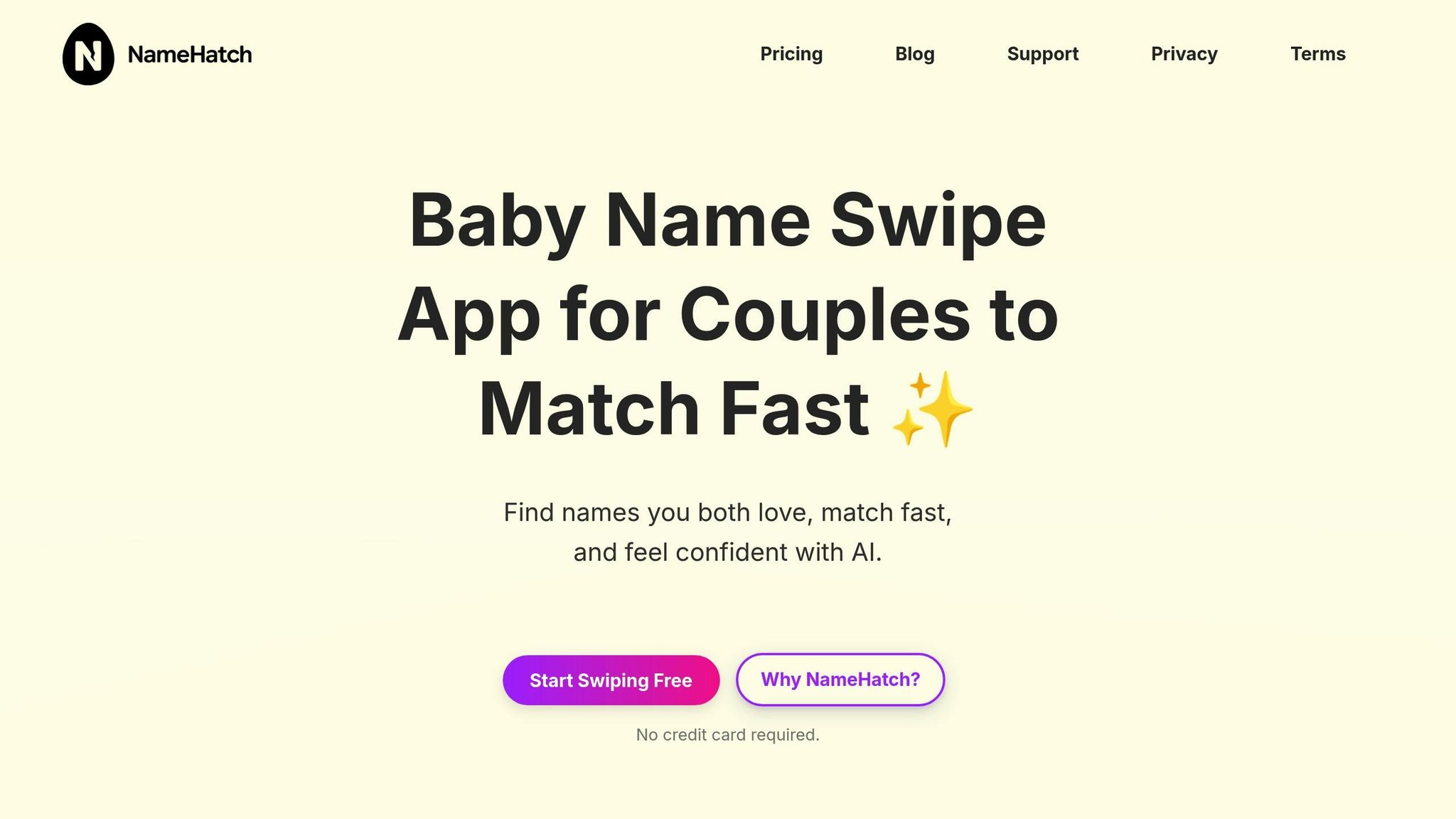Modernizing names is about respecting heritage while making them more practical and relatable in today's world. Names influence identity, perception, and opportunities, which is why many families are rethinking how to balance tradition with modern needs. Here's what you need to know:
-
Why Update Names?
Simplifying names can improve pronunciation, reduce bias, and make them more relevant globally. For example, Beyoncé streamlined her original name "Beyaoncellete" for broader appeal. -
Challenges with Older Names
Traditional names may be hard to pronounce, misunderstood, or even create barriers in professional settings. For instance, studies show people with "less foreign-sounding" names often experience better job prospects. -
Modernizing Approaches
- Shortening: William → Liam, Dorothy → Thea.
- Spelling Tweaks: Catherine → Kathryn.
- Blending: Isabella + Sophia → Bellphia.
- Pop Culture Influence: Bella (from Twilight).
-
Tools to Help
Platforms like NameHatch simplify the process with features like swipe-based discovery, filters, and partner collaboration.
The goal is to find a name that honors the past while aligning with modern identity and needs. Whether shortening, blending, or updating spellings, the right name reflects both where you come from and where you're headed.
Understanding Name History and Meaning
Names carry an incredible weight of history and tradition, often encapsulating centuries of memory and meaning in just a few syllables. They act as bridges, linking us to our ancestors, family stories, and deeply held values. This connection is why reimagining or updating a traditional name is not a task to be taken lightly - it’s a decision rooted in respect and understanding of what those names represent.
How Names Shape Identity
Names are more than just labels; they are a powerful part of our identity. Experts highlight that names are closely tied to our sense of self, reflecting both personal and cultural histories. For families in the United States with diverse backgrounds, traditional names often serve as a vital link between generations. These names carry the hopes, beliefs, and experiences of entire communities. When parents choose a name that reflects their heritage, they’re not simply picking a word - they’re passing on a legacy.
Take Cecilia Huang’s story, shared through Cold Tea Collective. She honored her great-grandfather by preserving the meaning of his name, "shining beauty", while adapting it to reflect modern gender perspectives. By sharing the story behind the name, she ensured its emotional and cultural significance remained intact. This example shows how names can evolve without losing their roots.
Across the world, traditional names reflect unique values. Whether it’s Russian saints' names, Korean Confucian traditions, or Spanish dual surnames, these names carry deep cultural meaning. They also act as markers of identity, connecting individuals to their ethnic or national heritage and fostering a sense of belonging. This is why changing or modernizing a traditional name feels so significant - it’s not just a personal choice but a way to preserve ties to entire communities and histories.
Problems with Old Names Today
Despite their rich heritage, traditional names can face challenges in modern contexts. One common issue is pronunciation. Traditional names may not translate easily into English, which can obscure or alter their original meaning.
But the difficulties go beyond mere inconvenience. A Canadian study found that job applicants with Asian names were less likely to be called for interviews compared to those with Anglo names. Historical data from the Age of Mass Migration (1850–1913) also revealed that immigrants in the U.S. often chose less foreign-sounding names for their children as they spent more time in the country. Research shows that having an American-sounding name can lead to better economic and social outcomes, such as higher educational attainment, greater earnings, and lower unemployment.
Some traditional names may also carry meanings that feel out of place in today’s world. For example, Zimbabwean names like Nhamo, meaning "Misfortune", hold deep cultural value but may not align with modern ideals or aspirations. This can create challenges for children growing up in a contemporary setting.
Additionally, gender-specific naming conventions can clash with today’s evolving views on identity. Traditional names that strongly define gender roles may not resonate with families who embrace more inclusive approaches to identity and self-expression.
As Maite Oxford, an expert on multicultural identity, puts it:
"The experience of who we are as individuals, and how we live, can no longer be confined to one single box." – Maite Oxford
These challenges don’t diminish the importance of traditional names. Instead, they highlight why many families are searching for ways to thoughtfully adapt them. By addressing practical concerns while preserving cultural essence, families can ensure that names honor the past while supporting a child’s future opportunities and sense of belonging. Recognizing these connections and challenges is the first step toward finding meaningful solutions.
Rules for Updating Names the Right Way
When it comes to updating names, the goal is to strike a balance between honoring their historical and cultural roots while adapting them for modern times. This isn’t about discarding tradition - it’s about evolving it thoughtfully. By preserving the essence of the original name - its meaning, history, and unique sound - you can create something that works for today without losing its connection to the past.
Keeping Original Meanings and Sounds
The first step in modernizing a name is to retain its core meaning and distinctive sound. For instance, the name William transforms into Liam, yet it still carries its Germanic meaning of "resolute protector." Similarly, Dorothy evolves into Thea, keeping its Greek roots and the meaning "gift of God." Even when Alexander is shortened to Xander, the rhythm and essence of the original remain intact. These kinds of updates show how a name can evolve while staying true to its origins.
Modern trends offer additional ways to refresh names while keeping them relevant.
Using Current Naming Trends
Contemporary naming trends emphasize familiarity with a touch of freshness. Shortened versions of traditional names are a popular choice: Isabella becomes Bella, Katherine turns into Kat, and Frederick is shortened to Ricky. Adjusting spellings is another way to modernize without altering pronunciation - Catherine might become Kathryn, or John could be spelled as Jon. Some families even blend traditional names to create new ones that feel modern but still rooted in heritage, like combining Isabella and Sophia to form Bellphia. Media and cultural influences also play a role, breathing new life into classic names and making them resonate with today’s world.
Blending old traditions with modern flair can further refine these updates.
Mixing Old and New Styles
The most effective updated names combine traditional significance with a modern twist. In a globalized world, keeping traditional names alive can be a way to celebrate and preserve cultural heritage. Family connections often guide these choices - updated names should complement siblings' names and honor family traditions. For example, Thomas becomes Tommy, and Margaret evolves into Greta, maintaining a familial link while feeling current. Practicality also matters - a modernized name should be easy to pronounce and suitable for professional environments, as seen when Alexandria is shortened to Alex. Creative approaches, like rearranging elements of names (e.g., Dylan or Ryan becoming Laney or Nari), offer fresh yet meaningful alternatives. Ultimately, a well-modernized name bridges the past and present, creating an identity that respects its heritage while embracing the future.
Methods for Updating Names
Updating names while keeping their historical or cultural roots intact can be a fascinating process. Here are some practical methods to modernize traditional names while preserving their essence.
Ways to Shorten or Change Names
One way to give classic names a modern twist is by shortening them. For example, Michael can become Micah, Joseph can evolve into Josiah, and Abigail might be simplified to Gail. These variations maintain a connection to the original names but feel more contemporary.
Another approach is name borrowing, where slight changes to popular names create fresh yet recognizable options. Think Emili instead of Emily or Camryn instead of Cameron. These subtle tweaks offer a unique spin without losing familiarity.
Blending names is another creative route. By combining elements of two traditional names, you can craft something entirely new. For instance, merging Isabella and Sophia gives you Bellphia - a name that honors both originals while introducing a modern flair.
Drawing Inspiration from Movies and Stories
Pop culture often influences how names evolve. Take the Twilight series, which helped popularize names like Bella (a modern nod to Elizabeth) and Jacob (a fresh take on Edward). These adaptations show how media can breathe new life into timeless names.
Beyond movies, literature, mythology, and folklore are treasure troves for name ideas. They offer options that carry deep meanings and unique sounds, making them perfect for today’s world.
Nature-inspired names are another option. For example, a classic name like Lily can transform into Blossom, connecting to the natural world while keeping a poetic charm. Similarly, international variations of names can provide modern updates that still respect the original meanings.
Mixing Old-Style and Modern Names
Combining vintage charm with modern trends is a great way to balance tradition and innovation. A name like Thomas can feel more approachable as Tommy, blending the old with the new.
For a more creative twist, reversing the sounds of a name can yield something fresh yet familiar. For instance, Naomi could become Imaon, offering a playful reimagining while nodding to its roots.
In today’s globalized world, blending naming traditions from different cultures is also a thoughtful approach. This method allows parents to honor diverse heritages while creating a name that feels both personal and inclusive.
Ultimately, the goal is to ensure that any modernized name remains easy to pronounce, fits well in various settings, and carries forward the essence of its origins.
sbb-itb-f13f980
Tools to Make Name Updates Easier
Finding the perfect name that bridges tradition and modern trends can feel like walking a tightrope. Thankfully, modern tools like NameHatch are here to make the process smoother and more enjoyable by blending timeless charm with contemporary flair.
How NameHatch Simplifies the Process

NameHatch takes the guesswork out of name selection with its intuitive swipe-based discovery system. This feature allows users to quickly browse through a variety of name options, making the process feel less overwhelming.
One standout feature is its smart filtering system, which lets you explore names by categories - whether you're drawn to classic, modern, or niche themes. For those seeking something truly tailored, premium filters offer a way to strike the perfect balance between tradition and a fresh, modern twist.
Another game-changer is the platform’s AI-powered personalized suggestions. As you swipe, the system learns your preferences and refines its recommendations, showing names that align with your taste. For example, names like Caspian and Liora - which combine timeless elegance with a modern edge - are highlighted as ideal options.
The Power of Collaboration in Name Selection
While advanced tools can streamline the process, collaboration remains key when it comes to choosing a name. One of the trickiest parts of modernizing names is ensuring both partners are on the same page. NameHatch tackles this with its partner matching feature, which provides real-time alerts whenever both partners like the same name. This eliminates the guesswork and helps avoid potential disagreements.
The platform also allows you to save, revisit, and share favorite names, reducing stress and ensuring that both partners can honor the cultural significance behind each choice.
To make collaboration even easier, NameHatch offers cross-platform compatibility, so both partners can contribute seamlessly, whether on a phone, tablet, or computer. This ensures that the journey to finding the perfect name becomes a shared and meaningful experience for both parties.
Making Final Choices: Old vs New
When it's time to make the final decision, the real challenge begins: should you hold onto tradition or opt for a modern interpretation? This choice is about finding the right balance - respecting cultural roots while embracing a fresh perspective. It’s a way of honoring the past while stepping into the future.
The debate between sticking with traditional names or leaning into modernized versions often boils down to three main factors: preserving cultural identity, practical considerations, and personal significance. Traditional names are steeped in history, carrying values and beliefs passed down through generations. On the other hand, modern adaptations can make these names feel more current and accessible while still respecting their origins.
A name acts as a bridge between legacy and identity, connecting family history to new beginnings.
Cultural identity is a big part of this decision. Across societies, names are more than just labels - they’re markers of heritage, family lineage, and tradition. When you modernize a name, you’re not just changing how it sounds; you might also be reshaping how your child connects with their roots. This ties back to earlier discussions about preserving ancestral heritage while adapting to contemporary norms. Many families strike a balance, perhaps using a traditional name as a middle name or opting for a modernized version that still reflects its cultural essence.
To help clarify these choices, here’s a comparison chart that highlights the trade-offs between cultural preservation and modern appeal.
Comparison Chart for Name Update Methods
Each approach to modernizing names offers a different mix of cultural connection and contemporary style. Understanding these trade-offs can help you make a choice that aligns with your family’s values.
| Method | Cultural Preservation | Modern Appeal | Ease of Use | Examples | Best For |
|---|---|---|---|---|---|
| Shortening | High | Medium | High | William → Liam, Dorothy → Thea | Families wanting strong cultural ties with modern simplicity |
| Spelling Updates | High | High | Medium | Catherine → Kathryn, Frederick → Ricky | Parents seeking subtle updates without losing tradition |
| Sound Adaptation | Medium | High | High | Michael → Micah, Joseph → Josiah | Those prioritizing ease of pronunciation while maintaining essence |
| Nickname Elevation | Medium | High | High | Alexander → Xander, Thomas → Tommy | Families looking for familiar yet modern options |
| Partial Extraction | Low | High | High | Margaret → Greta, Isabella → Bella | Parents prioritizing modern style over traditional connection |
Each method offers unique benefits. For instance, shortening names like William to Liam or Dorothy to Thea keeps cultural ties intact while adding simplicity. Spelling updates, such as Catherine becoming Kathryn, bring a modern touch while holding onto classical roots.
There’s no one-size-fits-all answer here. Some families lean into tradition, using names as a way to share their heritage, while others prefer streamlined, modern names that fit seamlessly into today’s world. The choice should reflect your family’s story, values, and how you want to blend cultural heritage with a modern identity. Ultimately, modernizing names is about honoring the past while embracing the present.
Conclusion: Finding the Right Mix
Modernizing names across cultures is about striking a balance between honoring heritage and embracing contemporary appeal. Naming expert Kate Barker captures this sentiment perfectly:
"Naming traditions, as diverse as the cultures they come from, can reveal a lot about what different communities value. In fact, a name can provide fascinating insights about both the individual who carries it and the one who chose it for them!"
Around the world, naming practices reflect unique values - whether it's paying tribute to elders, strengthening family ties, or selecting names believed to bring good fortune. These traditions provide a rich foundation for blending timeless customs with modern preferences.
There's no single formula for modernizing names. Some families might simplify a traditional name - like condensing a three-character Chinese name for easier use - while others incorporate family names as middle names to honor their roots. The goal is to create something that feels true to your family's story.
This process allows for creativity and flexibility. Families can combine names, use shortened versions, or craft entirely new ones that preserve a sense of identity while adapting to contemporary needs. It’s a reflection of how naming practices evolve to meet the demands of a changing world.
For couples navigating these decisions, tools like NameHatch make the journey easier and more enjoyable. With features like swipe-based name discovery, smart filters, and real-time matching, it simplifies the process of finding names that honor tradition while fitting seamlessly into modern life.
Modernizing names is part of a larger cultural movement - one that celebrates individuality while staying connected to our roots. Whether you lean toward preserving ancestral traditions or prefer adapting names for today’s world, the right choice is one that resonates with your family’s past and future.
Ultimately, the perfect name lies at the crossroads of meaning, practicality, and personal connection. With the right approach and tools, finding that balance becomes an exciting and fulfilling experience.
FAQs
How can families thoughtfully modernize a traditional name while preserving its cultural significance?
When updating a traditional name, families can focus on preserving the aspects that carry the most personal or heritage-based significance - whether that's the name's meaning, its pronunciation, or its connection to family history. This approach keeps the name rooted in its origins while aligning it with modern preferences.
Here are some ways to strike that balance:
- Honor the Name's Origins: Keep distinctive sounds or spellings that highlight the name's background and cultural identity.
- Celebrate Family Legacy: Maintain key elements tied to family traditions, even if they’re slightly adjusted to fit current trends.
- Simplify for Today: Modify complex features to make the name easier to use, without losing its core significance.
By weaving together tradition and contemporary style, families can craft a name that feels enduring yet fresh - something that will resonate for years to come.
How can I modernize a name while staying true to its cultural roots?
To update a name while respecting its roots, think about keeping essential linguistic features or sounds that tie it to its heritage. Reaching out to cultural experts or family elders can provide valuable insights, ensuring the revised name maintains its traditional importance. You might also consider tweaking the spelling or pronunciation to give it a modern touch or make it more user-friendly, without losing its original essence. Striking this balance between tradition and a fresh perspective keeps the name both relevant and meaningful.
How can modernized names influence career opportunities and social connections in a diverse society?
Modernizing names can have a big impact on how individuals are perceived in both professional and social settings. In a diverse society, names often serve as markers of identity and can shape impressions about a person's background, sense of belonging, and approachability.
In the workplace, having a name that feels familiar or easy to pronounce across various cultures might help reduce unconscious bias. It can also leave a positive impression during job applications or networking events. On a social level, modernized names can make it easier to build connections with people from different backgrounds, while still honoring one’s cultural heritage. Striking the right balance between staying true to one’s roots and adapting for broader acceptance ensures a name feels meaningful on a personal level while resonating within a larger community.



